|
De Nederlandse schrijver, dichter, neerlandicus en literatuurcriticus Willem Anton Marie (Wam) de Moor werd geboren in Zevenaar op 18 april 1936. Zie ook alle tags voor Wam de Moor op dit blog.
Rotstekening
De hemel vloeit blauw
langs de grauwrotsige hand
van het land.
Mijn liefste danst in het water.
Ze heeft haar been
als een vogel opgeheven
als een rose flamingo
Haar hoofd
wiegt op haar hals
Mijn liefste slaapt
in de zachtrode huid
van haar geurige lichaam.
Zal ik haar doen ontwaken
met de bloem van mijn mond?
Zal ik voorzichtig
haar hand aanraken?
Ik raak je aan
Ik raak je aan. Niet langer in het vlees
maar in de geest. Noem het bedaard.
Noem het bedeesd. Ik raak je aan.
Ik regel woorden die je raken.
Die dat waard zijn. Die het meest.
Ik raak aan lippen die mijn woorden
aten. Ik raak aan oren, die horen
willen wat verloren leek. Ik
raakte zo in alle staten, uitgelaten
en op streek. Hier aan de grens van
mijn bestaan raak ik je aan.
het is volbracht, gedaan. Wees maar
gerust, geraakt, ja, wees vanaf
vandaag maar eindeloos en
totterdood voldaan.
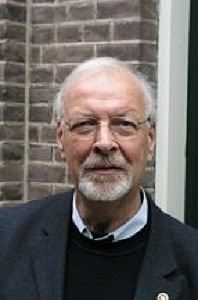
Wam de Moor (18 april 1936 – 12 januari 2015)
De Nederlandse dichter Bas Belleman werd in Alkmaar geboren “op een heldere ochtend in april” (Rottend Staal) van het jaar 1978. Zie ook alle tags voor Bas Belleman op dit blog.
Wieken
wat helikopterpiloten doen:
wieken door de lucht laten schaatsen.
kalm blijven, helm op. ijs is ijs, ook als het koorts is.
— je bent zo'n hypochonder de laatste tijd,
is dat sinds je vader?
— weet ik niet zeker, maar ik hoest toch?
dat verbeeld ik me toch niet?
slaap schommelt door me heen.
harceleren. stel: neerstorten zonder het te weten,
hartafwijking, zo zeldzaam zie je ze zelden.
— en mijn testikels, voel 'ns, zijn ze
harder dan anders? of komt dat door
— weet ik veel? verdomme, ga slapen.
— maar zo begint het vaak, hoor!
hellen, tuimelen, ik glijd steeds verder af.
helikopters breken hun voeten op het gras.
waar schaatsen mijn wieken heen?
waarom lucht die vriespijn zo vreselijk op?
Gedicht
[Zonder titel]
ondertussen bij de reparateur.
zijn uniform eerst dichtgeschroeid dan wegbezuinigd.
toch blijft hij ’s nachts met een mes in de groeven van de tramrails krabben
en collecteren voor kinderen met polio.
- als ik iets kon verkopen zou ik het doen.
maar ze willen niets hebben, zelfs mijn mes niet, zelfs jij niet.
mijn vrouw dijt uit en wil met me op dansles.
eet dan wat minder, zeg ik.
krab dan wat minder, zegt ze.
de tram kwam vlekkeloos als een simulatie aanglijden
en de reparateur stak trots zijn collectebus naar je uit
toen je uitstapte. je liep dwars door hem heen
alsof hij de eerste de beste orgelman was.
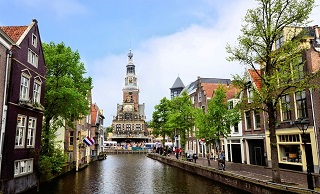
Bas Belleman (Alkmaar, april 1978)
Alkmaar
De Nederlandse schrijfster Roos van Rijswijk werd geboren in Amsterdam op 18 april 1985. Zie ook alle tags voor Roos van Rijswijk op dit blog.
Uit: Onheilig
“Miguel. Alfons had hem de voornaam van zijn verwekker gegeven. Het is mijn zoon niet, zei hij, laten we de schijn niet ophouden. Hij nam een paar dagen vrij aangezien hij toch de directeur was, aaide de zwarte haren van het jongetje, wist precies wanneer Miguel moest drinken. Liet me steeds die vingertjes en teentjes zien. 'Jongen toch, jongen toch,' mompelde hij soms boven de wieg, alsof Miguel zich enorm in de nesten gewerkt had. We stuurden geen geboortekaartjes.
Elke keer als ik mijn zoon zie verbaast het me hoe oud hij is geworden. Als ik over hem droom, droom ik hem klein, een kleuter of een jongen van een jaar of tien. Soms is hij zeventien en nog net niet het huis uit. Dan komt hij langs, in het echt, ik ben wakker, en heeft hij grijze haren door het zwart heen, stoppels, lijntjes in zijn gezicht. Hij wil me geen foto geven omdat hij bang is dat er iets van hem achterblijft in dit huis, en omdat hij niet voor zich wil zien dat ik naar die foto kijk; hij hoeft dat niet te zeggen, ik weet dat, ik ben zijn moeder. Ik ben je moeder, zeg ik tegen hem. Laat me niet alleen. Hij zegt: je hebt toch buren, vrienden, je zus, Leendert. Ik zeg: er is niemand. Hij zwijgt. Vraagt al lang niet meer om geld. De laatste keer dat ik mijn zoon zag is meer dan twee jaar geleden.
Ik heb aan Jacoba gevraagd of ik álles op moet schrijven. Ze zei: alleen wat je wilt. Ik zei: ik wil helemaal niks meer. Zij: waarom maak je er dan geen eind aan, dat heb je vaak genoeg geprobeerd en dood ga je toch. Dat komt nog wel. Ze is erg begripvol, hard ook, gevormd door haar vak. Jaar in, jaar uit praat ze met mensen die aan het sterven zijn. Mij verzocht ze te gaan schrijven. Niet om vrede te krijgen met mijn sterfelijkheid, dat zit wel goed, maar om te ontdekken waarom ik ondanks alles toch tegenover haar op die stoel zit. Als je er geen eind aan maakt, kun je net zo goed andere dingen doen. Ze hoeft het niet te lezen, zegt ze, ik moet het voor mezelf doen. Sterven terwijl ik wacht. Toen ze zei dat ik het voor mezelf moest doen en daaraan toevoegde dat dat ook wel eens mocht, iets alleen voor mij, moest ik huilen en Jacoba dacht waarschijnlijk dat dat was omdat ik me erkend voelde.”
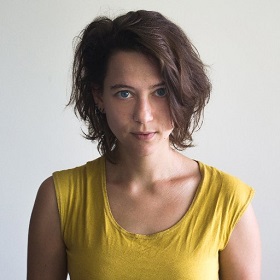
Roos van Rijswijk (Amsterdam, 18 april 1985)
De Nederlands dichteres en schrijfster Clara Eggink werd geboren in Utrecht op 18 april 1906. Zie ook alle tags voor Clara Eggink op dit blog.
Liedje
Ik liep laatst door de heide
Langs berken en langs brem.
Toen klonk er aan mijn zijde
Een kleine, ijle stem.
Aanhoudend en doordringend,
Zoo blij en mateloos
Alsof een hart hier, zingend,
Zijn hoogste vreugde koos.
O koolmees in het loover,
O heikruid in de zon
Uw lieflijkheid, uw toover
Die mij niet helpen kon.
Van lieverlede
Van lieverlede ga ik wel begrijpen
waar ik mij ruimer open stel
en het hart al minnende gaat rijpen,
dat ik, als ik mijn liefden tel
wel nader tot de mens kan treden,
maar
zij niet delen in mijn lot.
Ik kies dit in een koele vrede.
Ik min hen zeer, maar weet tot slot
alleen te zijn, van lieverlede.
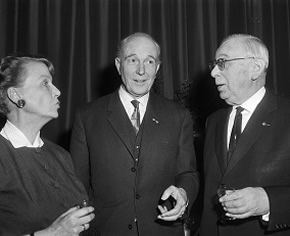
Clara Eggink (18 april 1906 - 3 maart 1991)
Hier met Nico Donkersloot en Victor van Vriesland in 1965
De Amerikaanse schrijfster, essayiste en feministe Kathy Acker werd op 18 april 1947 in New York geboren als Karen Alexander. Zie ook alle tags voor Kathy Acker op dit blog.
Uit: Portrait of an Eye
“Much later in the apartment on Squalor Street, in the Folsom Street prison, in this mental asylum I now live in, the constant maids guards nurses employees friends EV-ERYONE infuriate me. EVERYONE is Rockefeller, Justice, Society. I'm never left alone. I'm never allowed to live as I please. If my own free actions bother you, you can shoot me, you understand, I'd prefer that. I want to be happy. This is San Francisco. San Francisco is happiness. It's bizarre what I, or you, have to do not do sometimes to be happy .. I don't remember any people besides myself at first .. I remember sailors. I don't remember a nanny, a mommy, or any such nonsense. Sailors have cared for me. Only an ass hung over my cradle wood. Yes, that's the truth . . I'm three years old. I have a pretty pink robe. I'm always alone. I love being alone. I love very much playing in the back corners which smell good. Under the table. In the bathroom. Behind the bed. I'm now four years old. I set the curtains on fire. The greasy odor of the burnt cloth makes me convulse. I feel so strongly, so thrillingly, I come. I eat raw lemons and pieces of black leather. The smell of books, especially of poetry, makes me puke again. I remember also I was sick for a long time they made me drink insipid milk and orange water. For several centuries The Squalor Street chateau's been my dethroned family's refuge. The immense rooms, rooms on rooms on rooms on rooms on rooms, lie deserted. Only a well-trained squadron of servants dressed in blue and green rhinestones—the family trademark—long mustaches, flowing white feather capes over white silk short shorts. The cops patrol all the entrances of the park. Vice-squad and narcs alternately safeguarded our chateau. I most admired the white Vice-Squad. I would pass through the corridors drooling, watch the sentries clank their guns against their cocks after the custom of the Austrian court who order the soldiers of the Monk to face the wall and rub when the Monk walks past them. For hours I would stare at these cops. I couldn't trick insult them though they were socially and absolutely below me, for I feared their blue uniforms, their regular jerky motions. I tried to figure out why they moved and acted so creepily. Like robots. Thus I began to love machines. One day, in an endless meadow crickets luminescent sun etc., I began to dream of the new world: A world defined by the fact I could do whatever I want wherever whenever. I begin to faint, to disappear from this creepy world. I feel big strong arms around me I look into a cop's face. I feel shock and happiness. He was a gutter kid: a black leather hood. That's why the motor's, the machine's activity bound to images of hearing light sky space grandeur freedom enthrall me and balance use with a huge force.”
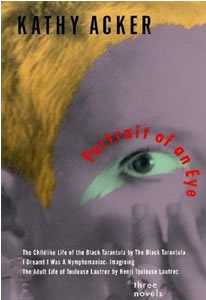
Kathy Acker (18 april 1947 – 30 november 1997)
Cover
De Amerikaanse dichteres en schrijfster Joy Davidman werd geboren op 18 april 1915 in New York. Zie ook alle tags voor Joy Davidman op dit blog.
Endymion: I Had Prayed to the Distant Goddess
I had prayed to the distant goddess all that while,
With the mad wish that Deity would bend,
Stoop to the level of a human love.
And that clear distant silver would not heed
Desire, imperious in its rule of me,
But rode the night down with her pack of stars.
And I knew that I dared the undefied,
That this most magic of the mysteries
Was not as fireflies to catch and crush,
Nor even as the mocking light that lures
A vain pursuit, but was beyond pursuit,
A far-seen vision, throned upon a cloud.
Then the moon answered and came down to me.
Oh — I had lain for many nights and sighed
Because she was no nearer, though I knew
The moon was brighter for the distance. Now
She has come down, the years’ dream has come true.
A silver shadow floating above my head,
The cold white moon dissolving in the air,
And dripping liquid silver through the pines,
Till it surrounded me in silver dew,
All of the brightness soft within my arms.
Yet she was magic, high above the pines,
Being divine and unattainable,
And white-serene, while I looked up at her.
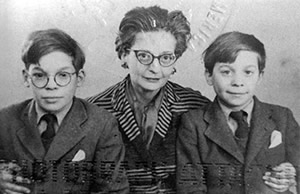
Joy Davidman (18 april 1915 – 13 juli 1960)
Met haar twee zoons in 1953
De Amerikaanse journalist en schrijver Richard Harding Davis werd geboren op 18 april 1864 in Philadelphia. Zie ook alle tags voor Richard Harding Davis op dit blog.
Uit: Captain Macklin: His Memoirs
“Now I see it–I see it now that it is too late. But surely he understood, he knew how I looked up to him, how I loved him, and how I tried to copy him, and, because I could not, consoled myself inwardly by thinking that the reason I had failed was because his way was the wrong one, and that my way was the better. If he did not understand then, he understands now; I cannot bear to think he does not understand and forgive me.
Those were the best days of my life, the days I spent with him as a child in his own home on the Hudson. It stands at Dobbs Ferry, set in a grove of pines, with a garden about it, and a box hedge that shuts it from the road. The room I best remember is the one that overlooks the Hudson and the Palisades. From its windows you can watch the great vessels passing up and down the river, and the excursion steamers flying many flags, and tiny pleasure—boats and great barges. There is an open fireplace in this room, and in a corner formed by the book— case, and next to the wood—box, was my favorite seat. My grandfather’s place was in a great leather chair beside the centre—table, and I used to sit cross—legged on a cushion at his feet, with my back against his knees and my face to the open hearth. I can still see the pages of “Charles O’Malley” and “Midshipman Easy,” as I read them by the lifting light of that wood fire, and I can hear the wind roaring down the chimney and among the trees outside, and the steamers signalling to each other as they pushed through the ice and fog to the great city that lay below us. I can feel the fire burning my face, and the cold shivers that ran down my back, as my grandfather told me of the Indians who had once hunted in the very woods back of our house, and of those he had fought with on the plains.”
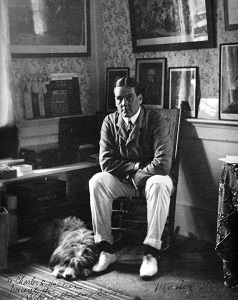
Richard Harding Davis (18 april 1864—11 april 1916)
De Australische dichter Henry Kendall werd geboren op 18 april 1839 in Milton. Zie ook alle tags voor Henry Kendall op dit blog.
August
Across the range — by every scarred black fell,
Strong Winter blows his horn of wild farewell.
And in the glens where yet there moves no wing,
A slow sweet voice is singing of the Spring.
Yes, where the bright quick woodland torrents run,
A music trembles under rain and sun.
The lips that breathe it are the lips of her
At whose dear touch the wan world's pulses stir —
The nymph who sets the bow of promise high,
And fills with warm live light the bleak gray sky.
She is the fair-haired August. Ere she leaves
She brings the woodbine blossom round the caves;
And where the bitter barbs of frost have been
She makes a beauty with her gold and green;
And, while a sea-song floats from bay and beach,
She sheds a mist of blossoms on the peach.
September
September, the maid with the swift, silver feet,
She glides, and she graces
The valleys of coolness, the slopes of the heat,
With her blossomy traces.
Sweet month, with a mouth that is made of a rose,
She lightens and lingers
In spots where the harp of the evening glows,
Attuned by her fingers.
The stream from its home in the hollow hill slips
In a darling old fashion;
And the day goeth down with a song on its lips
Whose keynote is passion.
Far out in the fierce bitter front of the sea
I stand, and remember
Dead things that were brothers and sisters of thee —
Resplendent September.
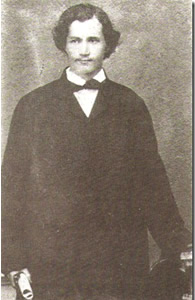
Henry Kendall (18 april 1839 – 1 augustus 1882)
Op 31-jarige leeftijd
Onafhankelijk van geboortedata:
De Duitse schrijfster Katharina Schwanbeck werd geboren in 1979 in Rostock. Zie ook alle tags voor Katharina Schwanbeck op dit blog.
Uit: Golden City
„Muss ich mir Sorgen machen? Doch, doch das Licht ist golden, außerdem kann ich meine Gedanken sehn, alles ist Liebe, siehste ... doch keine Einbildung! Oder? Oder?? Was wohl Jenny denkt? Ich muss sie nachher unbedingt fragen. Guckt die jetzt zu, sehe ich gut aus ... oh mann ist das angenehm, so warm ... ich würde sie gerne küssen…
Dann ist es vorbei und ich sage Danke zur Lehrerin und gebe ihr ein Küsschen links, ein Küsschen rechts.
Danach gehen Jenny und ich high die Straßen lang, die geraden, guten Straßen, dort wo die Büsche blühen und die Bäume. Wir blasen den Rauch unser filterlosen Zigaretten nach Westen, um unsere Ahnen herbeizulocken in diesen Frühlingswahnsinn. Denn wir wollen nicht allein sein, wir wollen viel lieber eins sein.
Dann läuft sie vor mir mit nackten Füßen die Glogauer längs, um die Erde besser spüren zu können unter der dicken Asphaltdecke. Bewusst geht sie jeden Schritt. Einatmen, ausatmen, Erdenergien durch die Fersen in den Körper lenken. Aaah. Das tut gut! Und ich bewundere Jenny, dass sie gar keine Angst zu kennen scheint. Vor Glasscherben, meine ich, oder Hundehaufen oder Spritzen, liegengelassen von achtlosen Junkies.
Das Licht lässt goldene Punkte über Jennys Haut flitzen, ihr Haar sieht aus wie eine kleine, lodernde Flamme.“
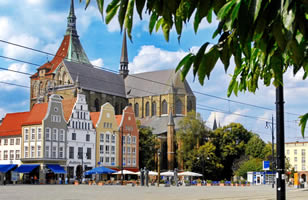
Katharina Schwanbeck (Rostock, 1979)
Rostock, Neuer Markt
Zie voor nog meer schrijvers van de 18e april ook mijn blog van 18 april 2015 deel 2.
|



